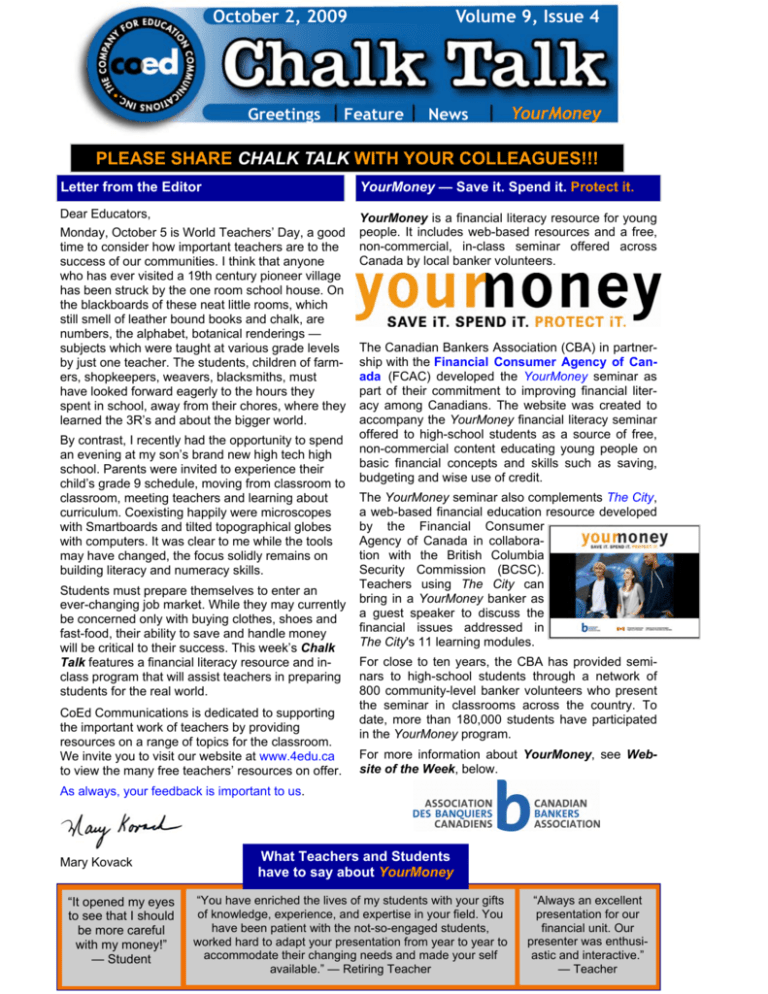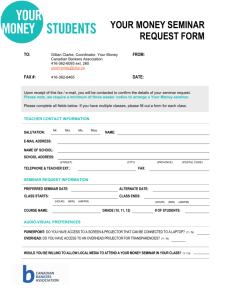chalk talk 10 02 2009 cba your money
advertisement

October 2, 2009 Greetings Volume 9, Issue 4 Feature News YourMoney PLEASE SHARE CHALK TALK WITH YOUR COLLEAGUES!!! Letter from the Editor YourMoney — Save it. Spend it. Protect it. Dear Educators, Monday, October 5 is World Teachers’ Day, a good time to consider how important teachers are to the success of our communities. I think that anyone who has ever visited a 19th century pioneer village has been struck by the one room school house. On the blackboards of these neat little rooms, which still smell of leather bound books and chalk, are numbers, the alphabet, botanical renderings — subjects which were taught at various grade levels by just one teacher. The students, children of farmers, shopkeepers, weavers, blacksmiths, must have looked forward eagerly to the hours they spent in school, away from their chores, where they learned the 3R’s and about the bigger world. YourMoney is a financial literacy resource for young people. It includes web-based resources and a free, non-commercial, in-class seminar offered across Canada by local banker volunteers. By contrast, I recently had the opportunity to spend an evening at my son’s brand new high tech high school. Parents were invited to experience their child’s grade 9 schedule, moving from classroom to classroom, meeting teachers and learning about curriculum. Coexisting happily were microscopes with Smartboards and tilted topographical globes with computers. It was clear to me while the tools may have changed, the focus solidly remains on building literacy and numeracy skills. Students must prepare themselves to enter an ever-changing job market. While they may currently be concerned only with buying clothes, shoes and fast-food, their ability to save and handle money will be critical to their success. This week’s Chalk Talk features a financial literacy resource and inclass program that will assist teachers in preparing students for the real world. CoEd Communications is dedicated to supporting the important work of teachers by providing resources on a range of topics for the classroom. We invite you to visit our website at www.4edu.ca to view the many free teachers’ resources on offer. The Canadian Bankers Association (CBA) in partnership with the Financial Consumer Agency of Canada (FCAC) developed the YourMoney seminar as part of their commitment to improving financial literacy among Canadians. The website was created to accompany the YourMoney financial literacy seminar offered to high-school students as a source of free, non-commercial content educating young people on basic financial concepts and skills such as saving, budgeting and wise use of credit. The YourMoney seminar also complements The City, a web-based financial education resource developed by the Financial Consumer Agency of Canada in collaboration with the British Columbia Security Commission (BCSC). Teachers using The City can bring in a YourMoney banker as a guest speaker to discuss the financial issues addressed in The City's 11 learning modules. For close to ten years, the CBA has provided seminars to high-school students through a network of 800 community-level banker volunteers who present the seminar in classrooms across the country. To date, more than 180,000 students have participated in the YourMoney program. For more information about YourMoney, see Website of the Week, below. As always, your feedback is important to us. Mary Kovack “It opened my eyes to see that I should be more careful with my money!” — Student What Teachers and Students have to say about YourMoney “You have enriched the lives of my students with your gifts of knowledge, experience, and expertise in your field. You have been patient with the not-so-engaged students, worked hard to adapt your presentation from year to year to accommodate their changing needs and made your self available.” — Retiring Teacher “Always an excellent presentation for our financial unit. Our presenter was enthusiastic and interactive.” — Teacher Give your students a financial head start! In 2008, the YourMoney seminar was redesigned and updated. The new seminar includes: A presentation deck (samples above), in PowerPoint or overhead transparency format In-class interactive budgeting exercise Student worksheet with quiz, budgeting tool, and links to other resources Presenter tools, including role-play script, and evaluation forms Check out YourMoney`s interactive website at www.yourmoney.cba.ca & join YourMoney`s FACEBOOK group. Educators — Bring financial literacy to life in the classroom! Sponsored by Canada’s banks and developed in partnership with the Financial Consumer Agency of Canada, the YourMoney seminar is a non-commercial financial literacy presentation for high school students, covering budgeting, saving, investing, wise credit use and keeping your money safe. More than 800 community from across Canada volunteer their time and expertise to deliver the seminar in schools. It’s easy to book a YourMoney in-class seminar ... Teachers can request a seminar any time during the school year by contacting the Canadian Bankers Association at www.yourmoney.cba.ca. Teachers will be matched with a local banker volunteer to present the material to their class. The interactive YourMoney seminar gives students the opportunity to learn about real-life financial subjects, and ask questions about the issues that matter to them. For more information about the program, or to book a seminar for your classroom, please visit www.yourmoney.cba.ca, or contact the YourMoney seminar coordinator at 416.362.6093 ext. 260. Statistics Canada … Business Studies and Economics — High School Lesson Plans The labour market — The changing nature of work, employment, and education in Canada (view here) In this lesson, students reflect critically on employment and education trends in different provinces, as evidenced in 2006 Census results. They create headlines that summarize the challenges and opportunities associated with changing labour market conditions and education levels. Then they assess actual plans created by provincial and territorial governments to address these opportunities and challenges. To conclude, they develop recommendations based on statistical data and designed to improve the government plans they have examined. Earnings and income — Earnings and incomes of Canadians over the past quarter century (view here) This lesson has students think critically about the changes in earnings and incomes of Canadians that are illustrated in census data. They assess the consequences of these income trends on various stakeholder groups, then rank these consequences in terms of the economic, social and political well-being of each group. Marketing — Identifying potential target markets (view here) With this lesson, students explore potential target markets for a bookstore. What community in their region would be the best location for this bookstore? Using Community Profiles on Statistics Canada's Learning Resources website, students research the demographic and socio-economic characteristics of two communities and compare their target markets. These lessons and more are available from the Statistics Canada Learning Resources website, in its resources by school subjects section. Click on Business Studies and Economics, and then click on the “Lessons” tab. Education News & Related Articles Internet teens failing math – Louise Brown, Education Reporter, ParentCentral.ca, TheStar.com, Sept 6/09 “So many Ontario teens are bombing university math now that there is no Grade 13, universities are scrambling to boost students' skills before they arrive. Alarmed at how weak high school grads seem in basic algebra – on some campuses up to 50 per cent fail or quit first-year math – a growing number of universities sent out surprise math packages this summer to incoming students to "clear out the cobwebs" and give emergency help to those who need it. "By and large, students are ill-prepared, and they get a rude awakening because up to 50 per cent either fail or drop math," said math professor Peter Gibson of York University, which has launched a task force to find ways to keep freshmen from flunking math. McMaster University also is sponsoring research into the problem. Math profs across the province blame a four-year high school program that leaves little time for mastering basics, and a culture unwilling to push young people to drill in necessary academic skills. Many, like McMaster professor Miroslav Lovric, also blame the igeneration's frantic multi-tasking for dissipating their powers of concentration. This may be the first generation of university students raised on the Internet, said Lovric, "so they've been multitasking and surfing the Web since they were 4.” How to contain back-to-school shopping -- Madhavi Acharya-Tom Yew, TheStar.com, September 1, 2009 “It’s beginning to look a lot like…back-to-school? If the urge to hit the stores just prior to Labour Day reminds you of the holiday season, there’s good reason. As shoppers load up on the latest fashions, books, pencils, and even computers and other electronic gadgets, back-to-school has become the second biggest shopping season of the year next to Christmas. A recent survey by Visa Canada found that Canadian parents and students expect to spend as much as $600 online from late summer through Labour Day. But with more families struggling to make ends meet during the recession, it’s important to remember that there are lots of ways to save money… Financial advisors say that back-to-school doesn’t have to break the bank. As always in matters of financial planning, the first – and often the most difficult – step is to separate the wants from the needs. “You need to create a realistic expense list and pour through it and say what do we really, really need. Then create a budget around that and stick to it,” said Jacqueline Meredith manager of the Morningside branch for Meridian Credit Union. Once you’ve made your list of what you need, figure out what you can really afford to spend.” To be added to this mailing list, please opt in by clicking here To be removed from this mailing list, please opt out by clicking here We are the Company for Education Communications. We specialize in developing, producing and evaluating school resources and award programs. Working in conjunction with Departments/Ministries of Education, school district/boards, associations, teachers and subject specialists across the country; we provide free, curriculum-based educational resources to Canadian classrooms. The opinions, conclusions and other information expressed in the preceding content do not necessarily reflect the views of and are not endorsed by CoEd Communications.






